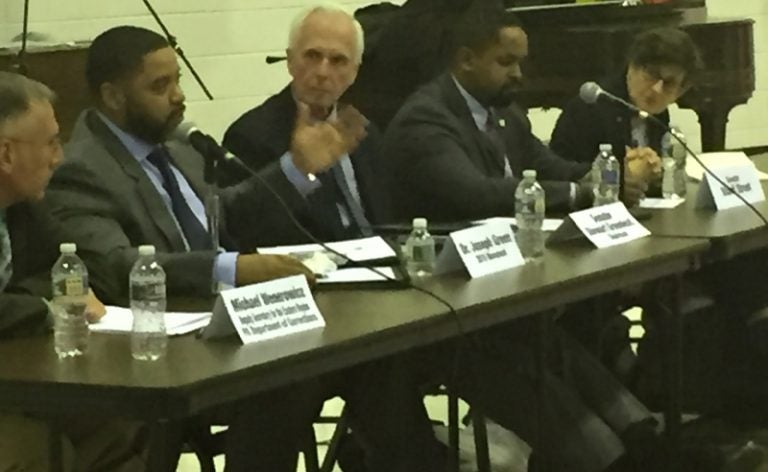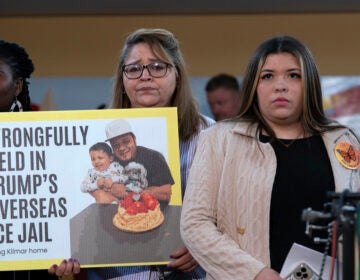Pa. lawmakers make bipartisan push for criminal justice reform
State Senator Stewart Greenleaf (R-Montgomery) confessed that he was one of the was one of those lawmakers who sponsored tough-on-crime laws in the mid-1990’s.

Stewart Greenleaf (third from left) and Sharif Street (fourth from left) held the second of three judiciary hearings on criminal justice reform at Deliverance Evangelistic Church in North Philadelphia. (Annette John-Hall, WHYY)
State Senator Stewart Greenleaf (R-Montgomery) sat before a packed crowd at Deliverance Evangelistic Church in North Philadelphia this week and confessed that he supported tough-on-crime laws in the mid-1990’s.
“I’m the worst offender. Most of these bills that we’re trying to repeal, I introduced and passed, the mandatory minimum and a lot of others,” said Greenleaf, majority chair of the Senate Judiciary Committee.
Greenleaf said he came to the realization that those kinds of punishment laws do little to reduce crime or recidivism. Between 1980 and 2009, although Pennsylvania’s overall population grew by only six percent, the state’s prison population increased 523 percent. And once inmates were released, more than half re-offended.
Punishment without rehabilitation, Greenleaf said, amounts to a failed system.
“We have no training. We have no jobs for them. Society has done that. Pennsylvania has done that. And what happens when they get out of prison? We keep punishing them,” he said.
Greenleaf convened the judiciary hearing — the second of three scheduled across the commonwealth — along with Sharif Street (D-Philadelphia). The two senators have launched a bipartisan effort to garner support for legislation that they say would better recognize the societal effects of mass incarceration.
Greenleaf and Street want the state to reduce its prison population and instead invest resources in education and job training for offenders. They say this year’s closure of a state prison in Pittsburgh produced a net annual savings of $80 million dollars.
Some of the more notable bills they support include SB 61, which provides training for public defenders; SB 62, which better allows incarcerated parents to remain involved with their children; and SB 63, which allows judges to deviate from mandatory minimum sentences. Each has stalled in committee.
A bill Greenleaf and Street oppose is also currently stalled in the Senate Judiciary Committee.
In April, the House passed a bill that would re-impose mandatory minimums for drug traffickers and other violent offenders. The Pa. Supreme Court had previously struck down the state’s mandatory minimum law on procedural grounds. Lawmakers believe the latest revision can pass legal muster.
Keir Bradford-Gray of the Defender Association of Philadelphia, testified that judges should take the time to consider human potential before imposing sentences.
“If I know the person as more than a thief on paper. But if I know them as a mother, a father, a brother a caretaker, I may treat them a little different in my decision on whether I will grant them bail or not,” she said.
Gary Strings, a West Philadelphia resident who attended the hearing, left feeling that the voices of the community were heard.
“It’s going the right way,” said Strings, who was incarcerated for six years. “Hopefully the state will listen to what the people are trying to tell them. If not, it’s going to be a revolving door. In and out. In and out.”
Although Pennsylvania’s prison population has been reduced slightly — from 51,757 in 2012 to 48,097 as of this year — it’s increased six-fold since 1980.
WHYY is your source for fact-based, in-depth journalism and information. As a nonprofit organization, we rely on financial support from readers like you. Please give today.





